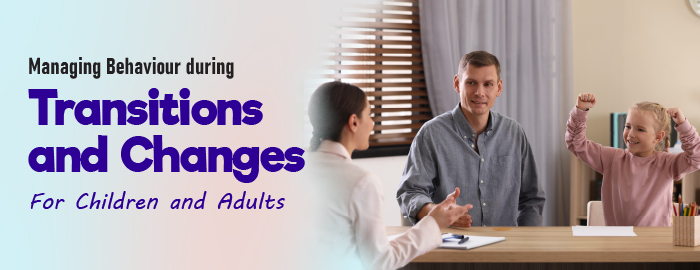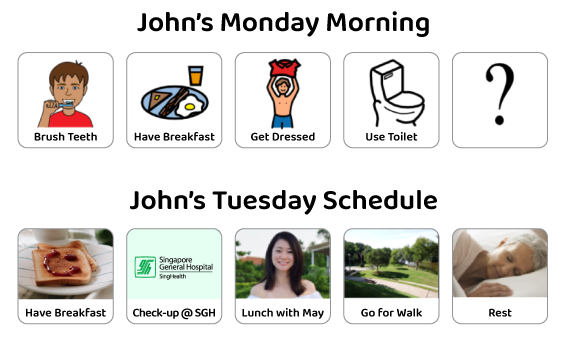|
If you are unable to view our Newsletter Issue 87, September 2021, view in browser.
|
| |
 |
| Issue 87 | September 2021 |

|
Managing Behaviour during Transitions and Changes
– For Children and Adults
Managing transitions and changes can be tricky for young children. Even more so for children with autism or special needs, since their behavioural inflexibility is more pronounced in their daily lives. Although having a set routine is beneficial in providing them with a sense of comfort and reducing their anxiety, it is still important for children with autism to develop cognitive flexibility and coping mechanisms for unexpected events.

Similarly, for adults with special needs, who suffered a stroke or have an acquired brain injury or neurological disease, they can find transitions between day-to-day activities challenging. They may forget activities that have been planned or experience increased anxiety when moving to new places.
The good news is, there are various forms of support that parents and caregivers can put in place to help these children and adults navigate through their activities of the day and encourage smoother transitions.

Below are some strategies you can use to facilitate transitions:
- Manage your expectations: Children are still developing their skills in managing their emotions and self-control, so be prepared for tantrums.
Adults and caregivers should anticipate cognitive, physical and emotional changes post-stroke, brain injury or diagnosis, and plan for extra time to complete activities.
- Keep them informed and involved in their schedule: Give children advance notice of an upcoming transition to allow time for the children to process the change. Let the children make their own choices by asking, "Do you want to do X or Y?"
Supporting client's autonomy has been found to be essential in helping achieve health goals and improve health outcomes (Ng, 2012). Adults should be actively involved in decision-making that relate to their daily activities even after a stroke, brain injury or other neurological diseases.
- Use a visual/written schedule: Having a visual schedule in the living room or bedroom can help children and adults break down their day and recall their schedule effectively (Kargopoulos et al., 2003).
Example:

Note: Child-friendly version (top) and adult-friendly version (bottom). Use of <?> symbol to incorporate flexibility within predictable routine.
- Acknowledge their feelings: It is important as a caregiver not to react negatively to undesirable behaviours. Try acknowledging their feelings (not their behaviour!) at that moment to help your child or the adult you’re caring for feel heard and understood. Example, “I can see that you are feeling very upset right now.”
- Using a countdown and many reminders: Try setting a physical countdown (timer app or using a kitchen timer) and invite your child to help press start. For adults, set an alarm if you need to leave the house for an appointment or if your caregiver needs to leave the house, to help reduce their anxiety.
- Consistency is key: If you are telling your child that this is the last video they can watch on the iPad, make sure you stick to it. This helps your child realise that you mean what you say, keeping their expectations consistent.
- Incorporate play: Play is the best and most natural way for children to learn about things. Role play with your child using their favourite toys to complete tasks. Example, "Now we’re going to get dolly to go to sleep, can you help dolly get dressed for bed?"
Additional Resources
Make your own visual schedules and symbols:
References
- Ng, J. (2012). Supporting Patient Autonomy Is Critical to Improving Health. Retrieved 12 August 2021, from https://www.psychologicalscience.org/news/releases/supporting-patient-autonomy-is-critical-to-improving-health.html
- Arain, M., Haque, M., Johal, L., Mathur, P., Nel, W., Rais, A., Sandhu, R., & Sharma, S. (2013). Maturation of the adolescent brain. Neuropsychiatric disease and treatment, 9, 449–461. https://www.doi.org/10.2147/NDT.S39776
- Kargopoulous, P., Bablekou, Z., Gonida, E. & Kiosseoglou, G. (2003). Effects of Face and Name Presentation on Memory for Associated Verbal Descriptors. The American Journal of Psychology, 116(3), 415-430.
|
|
 |

|
Leong Huimin
Speech Therapist
Huimin is a Speech and Language Therapist who graduated from the University of Melbourne with a Masters in Speech Pathology. She also holds a Bachelor of Arts degree, majoring in Psychology, from the same university.
Click here to get up close and personal with Huimin!
|
|
|
FREE
Trial or Discounted Session
|
|
Enjoy a free trial or discounted Speech Therapy session (for children and adults)!
|
|
Make an appointment with our Speech Therapist today. |
|
|
|
|
 |
| Free Trial or Discounted Session |
Dynamics Therapy Group understands that it may be a risk to book a therapy session with any centre without being certain that it is a good fit for your family. As such we would like to remove this hurdle and offer you a free trial or discounted session with our experts.
|
|
|
|
|
| Applied Behaviour Analysis (ABA) FREE Online Consultation |
|
Book your free online consult with our ABA professionals to learn more about ABA, discuss about your child’s best course of action, and more.
|
|
|
|
|
| Fun Food Tasting Workshops |
|
Join our fun food workshop for children this month.
|
|
|
|
|
| Discount for Adult Psychology |
|
We are offering a limited-time discount for our adult psychological services at Dynamics Psychological Practice. Enjoy your first session at an exclusive price of $50 (U.P. $220)!
|
|
|
|
|
| Free 2-day Trial at Dynamics International School |
Enjoy your free trial in 3 simple steps:
- Arrange for a school visit and book your child's trial lessons
- Your child attends the FREE lessons at Dynamics International School
- Share your post-trial feedback with us
|
|
|
|
|
|
 |
|
Connect with us—and keep up to date with our expert tips, exclusive promotions, and latest news.
|
|
|
 |
|
|
We are a vibrant multidisciplinary team of Speech and Language Therapists, Occupational Therapists,
Physiotherapists, Psychologists, Nutritionist, Educational Therapists and Teachers.
At Dynamics Therapy Group, you can be assured that you only get the best, from the best!
|
| © Dynamics Therapy Centre for Kids Pte Ltd. All rights reserved. |
|
|



